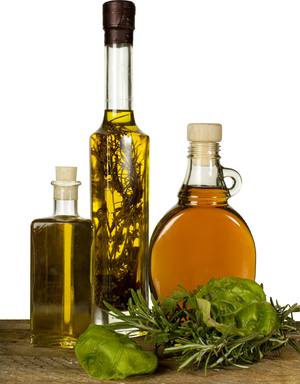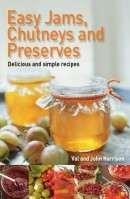Spiced Vinegar
 A lot of pickles and relishes are preserved in spiced vinegars. The spices used vary enormously according to the recipe and to individual taste. We’ve listed below examples of the most common combinations.
A lot of pickles and relishes are preserved in spiced vinegars. The spices used vary enormously according to the recipe and to individual taste. We’ve listed below examples of the most common combinations.
You can buy ready spiced or pickling vinegars, but making your own gives you even more control over the whole process. Cooking should be a creative art not an assembly line!
There are two methods for making spiced vinegar. The conventional method does, we think, give a lightly better result but the quick method is useful when you’ve none in stock and does give an acceptable result.
Don’t forget you need to buy your base vinegar with a minimum acidity level of 5%
Conventional Method
Tie the spice mixture into a muslin bag and put into cold vinegar in a jar or bottle. Tightly cover and leave for 6 to 8 weeks, shaking or stirring occasionally. For sweet spiced vinegar, first dissolve the sugar in the vinegar, and then add the spices tied in muslin before leaving to steep for 6 to 8 weeks. Keep tightly covered.
Quick Method
Place the vinegar and the spices (tied in a muslin bag) in a heatproof basin and stand the basin over a saucepan of water. Cover the basin with a plate or the flavour will be lost with evaporation. Bring the water in the pan to the boil and then remove it from the heat. Set aside for 2 – 3 hours to allow the spices to steep in the warm vinegar. Strain the vinegar and cool. For sweet spiced vinegar, follow the above steps, dissolving the sugar into the vinegar before setting aside to steep.
Spiced Vinegar Recipes
Each of these provide sufficient spices for 1.1 litres or 2 pints of vinegar
Mild Spiced Vinegar
- ¼ oz (7g) cinnamon
- ¼ oz (7g) cloves
- ¼ oz (7g) mace
- ¼ oz (7g) whole allspice berries
- 6 white peppercorns
Medium Spiced Vinegar
- ¼ oz (7g) cinnamon
- ¼ oz (7g) cloves
- ¼ oz (7g) white peppercorns
- ¼ oz (7g) dried root ginger
- ¼ oz (7g) mace
- ¼ oz (7g) whole allspice berries
Hot Spiced Vinegar
- 1 oz (28 g) mustard seeds
- ¼ oz (7g) dried chillies
- ½ oz (14g) cloves
- ½ oz (14g) black peppercorns
- 1 oz (28g) whole allspice berries
Sweet Spiced Vinegar
- 1.15 litres (2 pints) vinegar
- 900 g (2lbs) sugar
- 1 tablespoon (15ml) whole allspice berries
- 1 tablespoon (15ml) whole cloves
- 1 tablespoon (15ml) of coriander seeds and/or ¼ oz (7g) root ginger
- ½ cinnamon stick – about ¼ oz (7g)
- 4 blades of mace and/or rind of half a lemon
Note: Use brown sugar if using brown malt vinegar, white if using distilled malt (white) vinegar or wine vinegar.
Flavoured Vinegars
As well as pickling vinegar, you can make your own speciality vinegars.
Home made vinegars have many uses and are cheap to make. Herb and vegetable ones add interest to salad dressings and can be used in stews, soups, sauces etc. Fruit vinegars make refreshing drinks diluted with water or soda and add flavouring to desserts. White wine vinegar is usually the best one to use for these. There was a time when wine vinegar was quite expensive in the shops but nowadays you can pick it up anywhere and it’s very affordable.
Equipment:
- A large earthenware or glass bowl.
- Wooden spoon
- Scales
- Knives
- Bottles – clean and sterilized
- Covers – screw tops or corks
If using corks, they should be new and boiled for 10 minutes or kept submerged in boiling water for 15 minutes before use. This not only sterilizes them but makes them easier to push into the bottle. Screw tops also benefit from sterilizing in this manner.
General Information:
- Herbs are best picked just before they come into flower, early in the morning before the sun gets too strong but not after it has rained.
- Fruit vinegars should be kept in a dark cupboards or they will loose their colour.
- Wine vinegar, although more expensive, is usually better than malt as it is less harsh and does not mask the flavouring used.


